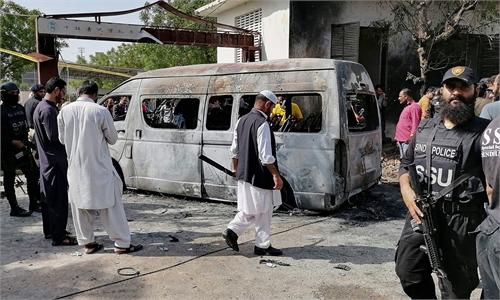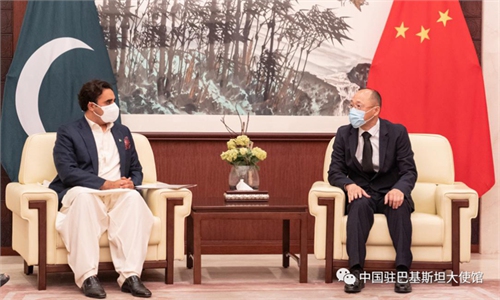
Pakistani investigators gather evidence at the site of an explosion in Karachi, Pakistan, on April 26, 2022. Photo: VCG
Given terror surge against Chinese nationals, an exclusive security mechanism separate from all national anti-terror arrangements is highly necessitated to be formulated to protect Chinese in Pakistan.
Fully-supported by malicious international players, nexus of evils have ganged up with one another to sabotage regional peace, CPEC and Pak-China relations.
In order to clamp them down ruthlessly a focused separate security mechanism is the solution if mandated to devise prolific action plans with single moto of securing safety of thousands of Chinese people working in Pakistan.
Current security-driven instruments like National Action Plan, National counterterrorism Authority, National Intelligence Coordination Committee (NICC) and others have their own specific functionalities and responsibilities. They lack single focus on Chinese security in totality.
Weakness of security paraphernalia for the protection of Chinese people surfaced when last year on July 14, a bus carrying Chinese engineers and construction workers engaged in building dam suffered a terror attack in Dasu area of Upper Kohistan district of Khyber Pakhtunkhwa province. Nine Chinese nationals died. Then minister Asad Umer had to confess that because dam construction was out of CPEC scope, security envelop did not include Chinese nationals.
Glaring blooper as cracks in security armor came to fore lately during Karachi University terror act that claimed lives of Chinese teachers of Confucius Institute. Again it transpired that since Confucius Institutes do not come under ambit of CPEC, security cover for Chinese teacher was inadequate.
Ongoing situation implies that if single-agenda based security structure solely emphasizing Chinese persons' safety is formed against terrorist organizations such as BLA, better security sense will prevail. It is direly needed to make things happen to expand the scope and coordination of all available institutional security instruments in Pakistan.
Last year for CPEC and Chinese nationals' foolproof security, National Intelligence Coordination Committee (NICC) came into being. Then Prime Minister Imran Khan chaired the inaugural session of the committee at the Inter-Services Intelli¬gence (ISI) headquarters. It was projected as a booster for cementing security coordination on CPEC. Given NICC preview in which probably 15 to 20 civil and army intelligence agencies will be integrating to improve intelligence sharing.
In order to revamp security standards for Chinese nationals, there is also a need to launch special capacity building courses for Special Security Division (SSD) for CPEC that consists of regular armed forces and elements of the "Civil Armed Forces" (CAF), which is a federal paramilitary force within the Ministry of Interior.
Besides the Pakistan Army (PA), the Pakistani Navy (PN) has also assembled forces for CPEC protection, such as the "Task Force-88" (TF-88) for the seaward security of the Gwadar port and protection of associated sea lanes against both traditional/conventional and nontraditional threats. The PN also raised a Coastal Security and Harbour Defence Force to tackle security threats along the coast and stationed a Force Protection Battalion (FPB, consisting of Pakistan Marines) at Gwadar for the protection of Chinese companies and workers. It is required to introduce innovative counterterrorism features to make a difference.
Except all, stakeholders have consensus that military operation is not the solution of ongoing insurgency in Balochistan that has put safety and security of Chinese nationals in jeopardy.
Let put all weight behind the solution of entire smothering affliction that has put safety and security of Chinese nationals in jeopardy.
The author is founder and president of the Institute of International Relations and Media Research in Pakistan. opinion@globaltimes.com.cn


